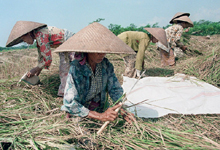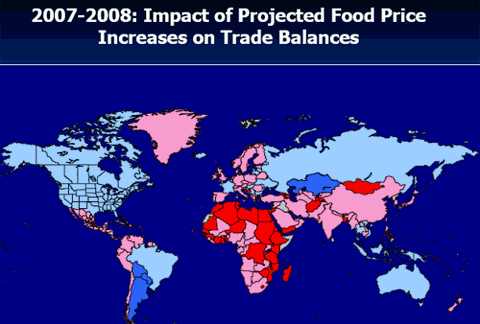The IMF and Civil Society

Harvesting rice in Doro, Indonesia: Global rice prices have risen more than 50 percent this year (photo: Maya Vidon/AFP)
The Food Emergency
April 29, 2008
Soaring food costs have moved to the top of the international community's policy agenda in recent weeks, including at the IMF and World Bank. This certainly should not be surprising: the reports of food-related hardships-and even unrest-are increasing daily as the prices of key food commodities soar. For example, global rice prices alone have risen more than 50 percent this year.
At an April 12 press conference after the spring meeting of the Fund's policy level International Monetary and Financial Committee, IMF Managing Director Dominique Strauss-Kahn underlined the nature of the looming crisis: "If food prices go on as they are today, then the consequences on the population in a large set of countries...will be terrible."
Masood Ahmed, IMF Director of External Relations, said at his April 24 press conference that the Fund is in talks with governments in 10 countries, mostly in Africa, about increasing financial assistance to cover rising global food prices. "Mali, Cameroon and Madagascar are among the countries being consulted," he said. "They have raised with us the possibility of augmenting their existing arrangements under the Poverty Reduction and Growth Facility to provide for additional financing to cover the costs associated with higher food prices. We are discussing their needs and will respond quickly to these requests." Targeted social assistance to the poor would the first-best policy, he added, but other temporary measures may be used, such as cuts in taxes on food.
World Bank President Robert Zoellick at a April 10 press conference, urged governments to act quickly to help hungry people by committing emergency aid to the UN World Food Program, which is seeking $500 million of emergency assistance by May 1. He also won backing from the IMF-World Bank Development Committee for a New Deal on Global Food Policy to combat hunger and malnutrition. Speaking to reporters after the April 13 meeting of the Development Committee, he warned that 100 million people could be pushed deeper into poverty if action is not taken. "We can't afford to wait," he said, adding that "we have to put our money where our mouth is-now-so that we can put food into hungry mouths. It's as stark as that."
"The food price crisis is a big concern to the Fund and we are going to devote a lot of resources—time, experts, and financial resources—in the coming weeks."
- Dominique Strauss-Kahn -
Policy Responses
The IMF advises that the response to rising food prices needs to be tailored to each country's circumstances.
- If the country can, it should seize the opportunity-and several countries are doing so-to encourage expansion of domestic agricultural production. This can be done effectively not by direct financing of production but by improving infrastructure and distribution and storage systems; increasing competition; removing policy distortions that discourage food production; and removing barriers to trade. However, countries should avoid distortionary policies such as untargeted subsidies.
- Temporary increases in food prices need not call for countervailing monetary policy, particularly if monetary policy is already accepted as credible. However, there may be a need for tighter policies if sustained high food price inflation starts to have significant second-round effects.
- The effect of temporary shocks could be mitigated by temporary and targeted subsidies, temporary tax measures, or increased reliance on international aid, all of which can help protect the most vulnerable.
The IMF's Role
Strauss-Kahn underscored after the April 13 Development Committee meeting that the food price crisis is "a big concern to the Fund and we are going to devote a lot of resources-time, experts, and financial resources-in the coming weeks.". He underscored this sentiment in an April 21 article in the Financial Times.
IMF staff teams are working to assess country-specific circumstances to ensure that the Fund provides policy advice and financial assistance in an effective and timely manner so that the governments can protect the most vulnerable. The Fund has a number of financing instruments available to help members cover food-related balance of payments strains. Many low-income countries can augment their existing financial arrangements with the Fund immediately. The IMF is also closely coordinating with other agencies on issues that require regional and international action.
Alerting the Public
Simon Johnson, Economic Counsellor and Director of the IMF Research Department participated in a panel discussion on NPR's The Diane Rehm Show to discuss what's behind the higher food prices and what can be done about them in the short and long term. Asked about the IMF's reaction to rising food prices, Johnson said "We're very worried. We worry about inflation always ... and particularly when we see this big impact on some of the poorest people in some of the poorest countries."
On April 12, Andrew Berg and Paulo Drummond of the IMF's African Department briefed CSOs participating in the IMF/WB Civil Society Policy Forum on the IMF's assessment of the challenges posed in sub-Saharan Africa by the recent increases in oil and food prices.
Reactions from Civil Society
Welcoming the statements from Strauss-Kahn and Zoellick, Oxfam International said that "it's very positive that the leaders of the World Bank and the IMF have shone a political spotlight on the food crisis." However, Oxfam also asserted that loan conditions imposed by the institutions have reduced the responses available to trade and agriculture ministers in developing countries for responding to the crises. Bank Information Center's Soren Ambrose offered a similar view: "The institutions are doing well to try to focus the attention of the world on the desperate situation that is rapidly introducing new instability to already-vulnerable countries, "he writes, adding that "it is also possible [...] to deduce that the institutions are working hard to be seen as part of the solution, in hopes that will make it less likely they are identified as part of the cause".
The One Campaign is collecting signatures for a petition to U.S. President Bush urging immediate action to give priority to issues of global poverty, including the world hunger crisis on the agenda of the July G8 Summit and to secure commitments at the summit for additional resources for all types of food assistance and increased agricultural productivity in developing countries.

Map illustrating trade imbalances due to higher food prices: Countries in red expected to suffer biggest trade balance losses; countries in blue expected to show biggest gains
